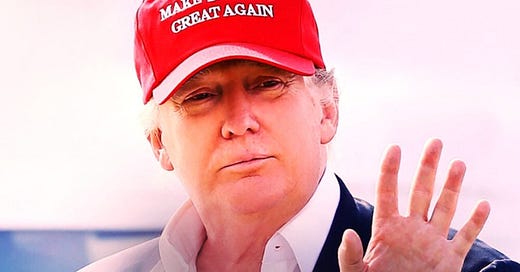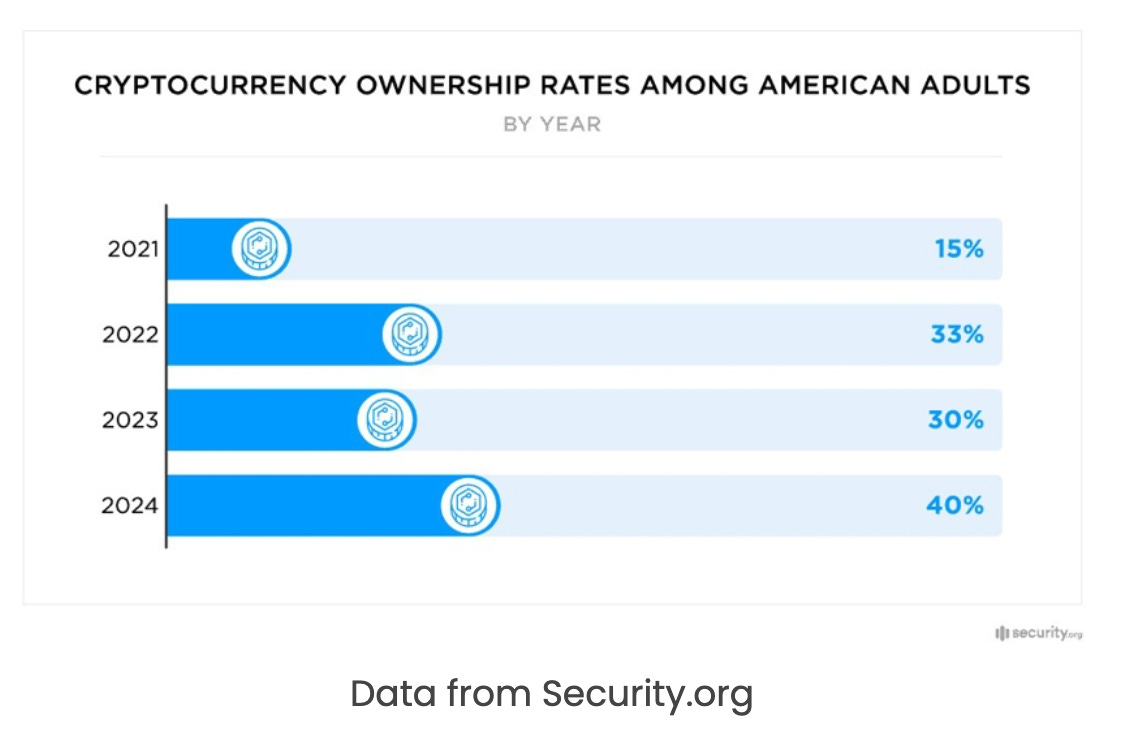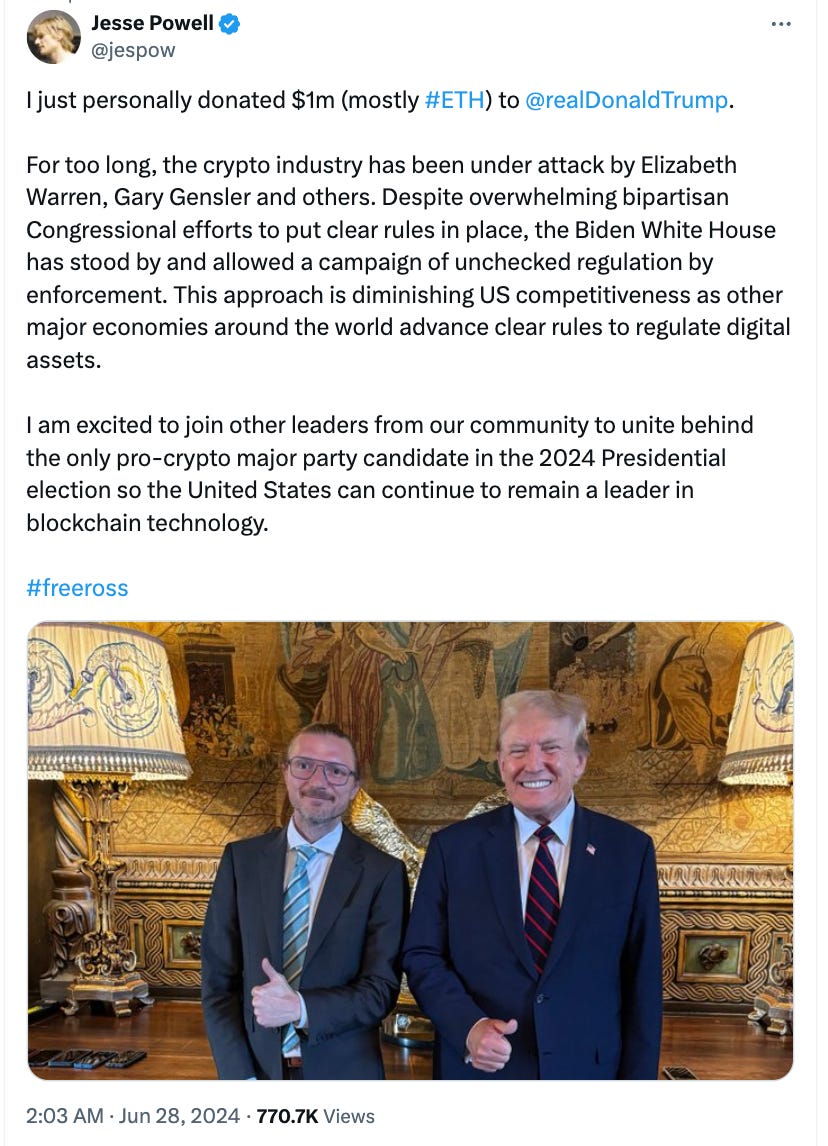Chartbook 302 Kamala v. crypto. Is 2024 really a Silicon Valley election? Or is this about "making Bitcoin great again"?
Given the importance of tech to the US economy and to our common sense of the future, given the role of the “magnificent seven” in the stock market, given the fact that Kamala Harris hails from California and is well connected in the tech scene and that J.D. Vance runs with tech investors, it is not surprising that the US election in 2024 is being dubbed the first Silicon Valley election.
But, is the in-fighting really about Silicon valley and its huge and politically diverse eco-system?
Or is this about something far narrower and less substantial?
Is this really about the crypto crowd and their fear of regulation?
Are we really in an era of californication? Or is the center of the action actually to be found elsewhere. Not in Silicon Valley, but on the other side of the country in Nashville Tennessee, the “red state tech hub”, where Trump will be attending a major, crypto-themed conference today and the slogan is picking up momentum:
Make Bitcoin Great Again.
Silicon Valley proper, is home to big tech, AI, thousands of platform businesses large and small, and ultra-sophisticated chip design. These are not industries fighting to secure their place in the economy, or their basic legitimacy.
Of course, tech firms have general political interests. Like any other business, they like to shape regulations, draw down subsidies and minimize taxation. But they will do that with any administration. Any administration will need them.
Crypto is partisan in a quite different way.
Crypto is an upstart.
At a deep level, crypto ideology shares some elements with the current Republican mood. It is a cocktail mixed of arcane tech, strange futurism, libertarianism, phobic attitudes towards the state and a dark view of human nature. It does not make for a good mix with American liberalism. You might say that it belongs in the broad church of “weird” that clusters around the Republican party today.
Over the years I’ve written several times about cyrpto. You can check out earlier pieces here.
Chartbook 74: Crypto and the politics of money.
Chartbook 175 Fortune Favors the Brave: the making of crypto ideology, Vesuvius and the romantic sublime.
To paraphrase Chartbook 15 I see: “Crypto is the fossil-fueled libertarian spawn of neoliberalism’s ultimately doomed effort to depoliticize money.”
Crypto tracks American history since 2008. As Finance Magnates notes:
at the time of the 2020 election, Bitcoin had been operating for eleven years, Ethereum had only been live for five years, and many key DeFi protocols were only two or three years old (Maker, for example, launched as a working product in 2017, Uniswap and Compound in 2018.) But skip forward to 2024 and the situation has evolved rapidly, with spot BTC ETFs operated by BlackRock and Vanguard (among others) now part of the TradFi landscape, spot ETH ETFs also lining up for launch later this summer, and–according to a recent report–40% of Americans now holding crypto.
Trump himself was not originally crypto-aligned. During his time in office he described cryptocurrency “a scam” and a “disaster waiting to happen”. But that didnt stop bitcoin’s speculative assent. It was during the Biden term that bitcoin both hit its all-time highs and suffered shocking sell offs.
It was under Biden that the cheap-money era ended, FTX collapsed and Sam Bankman-Fried was sentenced to 25 years in prison.
The Biden administration, and specifically Biden’s aggressive SEC chair Gary Gensler, have made the first to attempt to regulate the crypto business, not within a boutique tailor-made regulatory system all of its own, but as part of the financial system.
Unsurprisingly, crypto interests don’t like any of this. They denounce it as a threat not just to their industry but to innovation as such and thus also to the future of the US economy and indeed to its national power. As the Washington Post’s Tony Romm described the dynamic:
For many crypto titans, the catalyst for action came two years ago (2022), after the downfall of FTX, previously the world’s third-largest crypto marketplace. Many Democrats, including Sen. Elizabeth Warren (Mass.), immediately demanded stringent new rules, while the Securities and Exchange Commission, led by Chairman Gary Gensler, filed a battery of lawsuits alleging the best-known crypto firms had failed to follow basic federal investor protections. Often, the targets of SEC scrutiny — including Coinbase, a digital asset marketplace, and Ripple, which offers the popular XRP token — blasted the cases as evidence of Gensler’s bias against the industry. They coupled their court battles with an expensive lobbying campaign designed to neuter the SEC and stave off other regulations, including rules meant to prevent terrorist groups from trafficking in crypto. And crypto executives and investors began pouring money into the 2024 election, launching three super PACs that have run ads targeting congressional candidates who oppose digital currencies.
Given this stark political alignment, Trump has had no difficulty switching positions and coming out wholeheartedly for the crypto cause.
The RNC platform promises that: “Republicans will end Democrats’ unlawful and un-American crypto crackdown and oppose the creation of a Central Bank Digital Currency. We will defend the right to mine Bitcoin, and ensure every American has the right to self-custody of their digital assets and transact free from government surveillance and control.”
And Trump has bought in on the national security angle:
"If we don’t do it, China is going to pick it up," Trump said in an interview with Bloomberg … when describing his recent embrace of digital assets. "I don’t want to be responsible for allowing another country to take over this sphere."
In 2024 the crypto money has rolled into the Trump campaign. To give one prominent example, at the end of June, Jesse Powell, the founder of crypto exchange Kraken, publicly announced a donation to Trump of $1 million, mainly in ETH (Ethereum).
On the subject of “weird”, the hashtag “#freeross” refers, as Finance Magnates explains, to:
Ross Ulbricht, who in 2015 was sentenced to double life in prison plus forty years without parole, having built and run the online black market Silk Road, which mainly facilitated drug trades paid for in BTC. This is relevant in Powell’s post because last month Trump pledged, if elected, to commute Ulbricht’s sentence to time served, demonstrating awareness that the Silk Road operator’s incarceration is a major issue among veteran bitcoiners, who view the sentence handed down to Ulbricht as disproportionately harsh.
Of course, Silicon Valley has long been a donor to American political campaigns, but this crypto surge is new. If the Vance pick was popular with anyone, it wasn’t with big tech and Silicon Valley in the general sense, but with crypto-aligned right-wing interests. Prominent Trump backers from the crypto scene include Tyler and Cameron Winklevoss, ARK Invest founder and CEO Cathie Wood - “I am a voter when it comes to economics, and on that basis, Trump” - tech entrepreneur David Sacks and hedge fund manager Bill Ackman.
Direct donations from major crypto companies have soared.
Source: Washington Post
This is just the beginning. The pro-crypto fund-raising super Pac Fairshake allegedly has more than $200mn in hand from backers including Coinbase, Ripple and Andreessen Horowitz.
As the Washington Post reports, earlier in the year Trump and his campaign were meeting repeatedly with David Bailey, “a cryptocurrency entrepreneur, who has promised to hold Trump a $15 million fundraiser in Nashville… One of the private meetings Bailey had with Trump was in New York at Trump Tower this past spring during the former president’s criminal trial on business fraud charges, according to people with knowledge of the meeting. His campaign announced they would take donations through cryptocurrency days after that meeting.”
Trump is now appearing at the Nashville event. The bitcoin faithful hope that he will announced a national bitcoin reserve. The truly absurd idea is that the US should hold a standing reserve of tokens. The consequence will be to drive demand and help stabilize prices.
Contrary to GOP propaganda, Kamala Harris is anything but a regulatory radical. There was, for a while, a rumor that Harris might actually be appearing at the Nashville crypto conference too. That plan has now been dropped. As USA Today reports:
David Bailey, CEO of conference organizer Nashville-based BTC Media — the parent company of Bitcoin Magazine — announced Tuesday that the conference was “in talks” with Vice President Kamala Harris’s presidential campaign to schedule her as a speaker. The next day, he said she declined the invitation and that “it would have been a disaster for her” anyway.
No one can imagine that there is much hope for Harris of winning over the MAGA-bitcoin die hards. But what the Harris camp have announced is an effort at a resent.
In the case of Harris the aim is not to win over the fanatics but to reassure the broader tech community of her favor. As George Hammond, James Fontanella-Khan and James Politi report for the FT:
Kamala Harris’s advisers have approached top crypto companies to “reset” relations between her Democratic party and a sector that has come out as an important backer of Donald Trump, her rival for the US presidency. Members of the vice-president’s team have contacted people close to crypto companies about meeting in recent days, said four people with knowledge of the matter. Those include leading exchange Coinbase, stablecoin company Circle and blockchain payments group Ripple Labs, two of the people said. … People advising the Harris campaign on business matters said the decision to reconnect with the crypto industry had little to do with attracting new electoral contributions. They said the objective was instead to build a constructive relationship that would ultimately set a smart regulatory framework that would help the growth of the entire asset class. The outside advisers to the campaign said Harris wanted to change the perception among many top executives America that the Democrats were anti-business. … Harris is aiming to win back those in the tech community, many of them in her home state of California, who have turned away from the party in protest at the threat of new taxes or regulation of their industry. … Some crypto companies are hopeful Harris will be more sympathetic to them. “The fact that she’s willing to listen is a big deal. With Biden you couldn’t even get a meeting . . . It has left people with such a bad view of the Biden administration,” one crypto company executive said.
Remarkably, crypto has thus become a symbol of wider relations between the Democratic Party and business. From the point of view of the once marginal crypto camp, this is in itself a win.
Meanwhile, at the Nashville conference, rumor has it that pro-crypto Republican Senator Cynthia Lummis of Wyoming is preparing, just ahead of Trump’s speech to launch the bitcoin reserve proposal. As Fox Business reports:
According to three crypto executives with knowledge of the bill, Lummis has been quietly working to announce at the annual Bitcoin Conference legislation that would require the Federal Reserve to hold some bitcoin as a strategic reserve asset. … While specifics of the legislation are unclear, the purpose of the bill, according to a person who has seen initial drafts, intends to direct the Fed to buy bitcoin and hold it as a reserve asset in the same way that the nation’s central bank holds gold and foreign currencies .. even the introduction of legislation – and Trump's possible support – classifying bitcoin as a reserve asset would be an admission from the top levels of government that bitcoin is a legitimate financial asset, something the crypto industry has been aiming for in its quest for mainstream acceptance. "Classifying the world’s largest cryptocurrency as a strategic reserve asset would be the firing gun in the ‘Bitcoin Space Race,’" said Sam Lyman, director of public policy at bitcoin miner Riot Platforms. "If the United States – the wealthiest country in the world and the home of global capital – began accumulating bitcoin on its balance sheet, other countries would have powerful incentives to do the same. This would send the nation-state game theory into hyperdrive as sovereigns scramble to accumulate the scarcest monetary asset on planet Earth."
Ironically, as Fox Business goes on to report, the US would be well placed in that competition:
The U.S. is already the biggest nation-state holder of bitcoin, so it has a strong head start. It currently holds around 210,000 bitcoins with a current value of just over $66,000 per token, due to the Department of Justice seizing large sums from illicit actors over the years.
So there you have it, by the end of today we could have a convicted-felon Republican presidential nominee pushing a concerted effort to weaken the dollar whilst backing a plan for a Federal bitcoin reserve based on the confiscated assets of other convicted felons.
Would that be the ultimate in hucksterism? Who in this American electoral cycle would rule it out? Perhaps this afternoon from Nashville we will find out.
I love writing Chartbook. I am delighted that it goes out for free to tens of thousands of readers around the world. In an exciting new initiative we have launched a Chinese edition of Chartbook, on which more in a later note. What supports this activity are the generous donations of active subscribers. Click the button below to see the standard subscription rates.
I keep them as low as substack allows, to ensure that backing Chartbook costs no more than a single cup of Starbucks per month. If you can swing it, your support would be much appreciated.










"broad church of “weird” that clusters around the Republican party today" is such a great phrase, I'm stealing it. Makes me think of JD Vance's "heartwarming" story, told at the convention, about how after his grandmother died they found 19 loaded handguns secreted about her house, from the couch cushions to the silverware drawer, a story received with rapturous applause from all in attendance.
Well, Trump is if nothing else an opportunist.
But crypto is a casino play regardless -- for gamblers only.